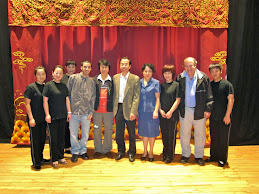On Sunday I said farewell to the group of 47 Maryland law students, alumni, faculty, and friends who spent their spring break visiting China. The trip was a huge success with the group visiting Beijing, X’ian and Shanghai. I did not accompany the group to X’ian on Wednesday because I had to teach class on Thursday and present a guest lecture at Tsinghua University’s School of Public Policy and Management. I flew to Shanghai on Friday morning to rejoin the group after they arrived from X’ian.
On Friday evening the group attended a reception at the Maryland Center, the state’s office that promotes trade and economic development with China. The reception was sponsored in part by DLA Piper, the firm that also had hosted a reception for us in Beijing. Several prominent members of the legal community in Shanghai were present at the reception. ZeeZee Zhong, director of the Shanghai branch of Jane Goodall’s Roots & Shoots organization gave a great presentation on their work promoting environmental education in primary and secondary schools in China. Peking University law professor Dan Guttman gave a wonderful talk debunking common misconceptions about the development of the rule of law in China. Ning Shao, Chief Representative of Maryland’s China Office, talked about the office’s work in promoting closer ties between Maryland and China.
On Saturday the group toured Shanghai, visiting the JinMao Building, the YuYuan Gardens, the Jade Buddhist Temple, and other notable sights. After a great farewell dinner on Saturday night, many of the students gathered at Shanghai nightspot the Glamour Bar on the Bund to party late into the night. On Sunday the group flew back to the U.S. and I returned to Beijing for another week of classes.
Wednesday, March 26, 2008
Wednesday, March 19, 2008
Maryland Environmental Law Students (& MLB) Arrive in China
On Friday March 14 a group of 47 Maryland law students, faculty, alums and friends arrived in Beijing to spend their spring break traveling around China. I met the group at the airport along with our China tour guide Zhong Xin and my student assistant Huang Jing. We have been having a terrific time. On Friday we visited Tiananmen Square and the Forbidden City. The group then went off to the Summer Palace while one of the students and I watched the debut of Major League Baseball in China with the Padres playing the Dodgers in an exhibition game at Wukesong Stadium, where the Olympic baseball competition will be held in August. We rejoined the group for a Beijing duck dinner. On Saturday night I led a group of students on an expedition to the watering holes of Houhai Lake. On Sunday we went to the Great Wall and then returned to Beijing for a tour of a hutong and dinner in a courtyard house.
A group of my Chinese environmental law students joined the Maryland group for some of their tours. On Monday the Maryland students came to the China University of Political Science and Law, where I teach, for a special program. The Maryland students showed some of the films they made in my environmental law classes over the years. They discussed with my Chinese students how to do it since I am asking the Chinese students to make films as a class project this semester. We also held a demonstration moot court, using members of Maryland’s International Environmental Moot Court Competition, who were questioned by some of my Chinese law students serving as judges. On Tuesday afternoon, we put on a program at the U.S. Embassy where both Maryland and Chinese students heard from lawyers working with environmental NGOs. These included Alex Wang, director of NRDC’s Beijing office, Zhang Jingjing, litigation director of the Center for Legal Assistance to Pollution Victims, and David Lennett, an environmental consultant who works with a number of NGOs in China. Two U.S. law firms hosted receptions for the Maryland students at their Beijing offices - Hogan & Hartson on Monday and DLA Piper on Tuesday.
I have posted online a web gallery of photos from the trip, which is at: http://gallery.mac.com/rperci/100148. I also have posted a gallery of photos of Major League Baseball in China at: http://gallery.mac.com/rperci/100141.
A group of my Chinese environmental law students joined the Maryland group for some of their tours. On Monday the Maryland students came to the China University of Political Science and Law, where I teach, for a special program. The Maryland students showed some of the films they made in my environmental law classes over the years. They discussed with my Chinese students how to do it since I am asking the Chinese students to make films as a class project this semester. We also held a demonstration moot court, using members of Maryland’s International Environmental Moot Court Competition, who were questioned by some of my Chinese law students serving as judges. On Tuesday afternoon, we put on a program at the U.S. Embassy where both Maryland and Chinese students heard from lawyers working with environmental NGOs. These included Alex Wang, director of NRDC’s Beijing office, Zhang Jingjing, litigation director of the Center for Legal Assistance to Pollution Victims, and David Lennett, an environmental consultant who works with a number of NGOs in China. Two U.S. law firms hosted receptions for the Maryland students at their Beijing offices - Hogan & Hartson on Monday and DLA Piper on Tuesday.
I have posted online a web gallery of photos from the trip, which is at: http://gallery.mac.com/rperci/100148. I also have posted a gallery of photos of Major League Baseball in China at: http://gallery.mac.com/rperci/100141.
Tuesday, March 4, 2008
First Classes
This week I had my first classes at the China University of Political Science and Law (CUPL). CUPL probably has more students interested in Environmental Law than any other law school in China. This is in large measure the result of Professor Wang Canfa teaching there. He is the founder and director of the Center for Legal Assistance to Pollution Victims (CLAPV). I am teaching two classes at CUPL - Environmental Law, which meets for three hours on Monday afternoons, and Comparative Law, which meets for two hours on Thursday mornings. I am focusing on comparative environmental law in the latter class and using it to introduce the students to the concept of global environmental law.
There are 45 students in my Environmental Law class and 25 students in my Comparative Law class. As I do in my classes at Maryland, I start the first class by filming the students introducing themselves. I use the video to make individual photos of each students. This allows me use iPhoto to construct a digital seating chart, with the audio available to ensure that I can pronounce each name correctly. I then create a slideshow of the class to test myself on how well I remember each student’s names. I show the slideshow to the students at the beginning of the second last.
This practice has proven particularly valuable here in China where the names are somewhat harder for me to remember given my relative lack of familiarity with Chinese names and the fact that there are six Wangs in my Environmental Law class. It also elicited a particularly warm response from the Chinese students who frequently have classes where they sit passively as the professor lectures at them without making much effort to engage them. I posted the raw videos of the students online so that the students could view them. The Environmental Law class video is online at: http://gallery.mac.com/rperci#100102. The video of my Comparative Law class is online at: http://gallery.mac.com/rperci#100110.
I was impressed with the quality of the English spoken by many of my students, though I am following the advice of former Fulbrighters in trying to speak as slowly as possible. I also was impressed with the high level of interest in environmental law expressed by students in both classes. Class discussions of environmental issues leave me with the impression that there is less understanding of the threat of global warming here than among my Maryland students, perhaps because basic pollution problems pose a much more immediate challenge in China. There also seems to be much greater concern among my Chinese students about job prospects in the environmental field. While my Maryland students generally can be confident about their job prospects in the environmental field, many of the Chinese students are making a leap of faith that jobs will materialize in the future in a field that is just developing.
There are 45 students in my Environmental Law class and 25 students in my Comparative Law class. As I do in my classes at Maryland, I start the first class by filming the students introducing themselves. I use the video to make individual photos of each students. This allows me use iPhoto to construct a digital seating chart, with the audio available to ensure that I can pronounce each name correctly. I then create a slideshow of the class to test myself on how well I remember each student’s names. I show the slideshow to the students at the beginning of the second last.
This practice has proven particularly valuable here in China where the names are somewhat harder for me to remember given my relative lack of familiarity with Chinese names and the fact that there are six Wangs in my Environmental Law class. It also elicited a particularly warm response from the Chinese students who frequently have classes where they sit passively as the professor lectures at them without making much effort to engage them. I posted the raw videos of the students online so that the students could view them. The Environmental Law class video is online at: http://gallery.mac.com/rperci#100102. The video of my Comparative Law class is online at: http://gallery.mac.com/rperci#100110.
I was impressed with the quality of the English spoken by many of my students, though I am following the advice of former Fulbrighters in trying to speak as slowly as possible. I also was impressed with the high level of interest in environmental law expressed by students in both classes. Class discussions of environmental issues leave me with the impression that there is less understanding of the threat of global warming here than among my Maryland students, perhaps because basic pollution problems pose a much more immediate challenge in China. There also seems to be much greater concern among my Chinese students about job prospects in the environmental field. While my Maryland students generally can be confident about their job prospects in the environmental field, many of the Chinese students are making a leap of faith that jobs will materialize in the future in a field that is just developing.
Subscribe to:
Posts (Atom)
















